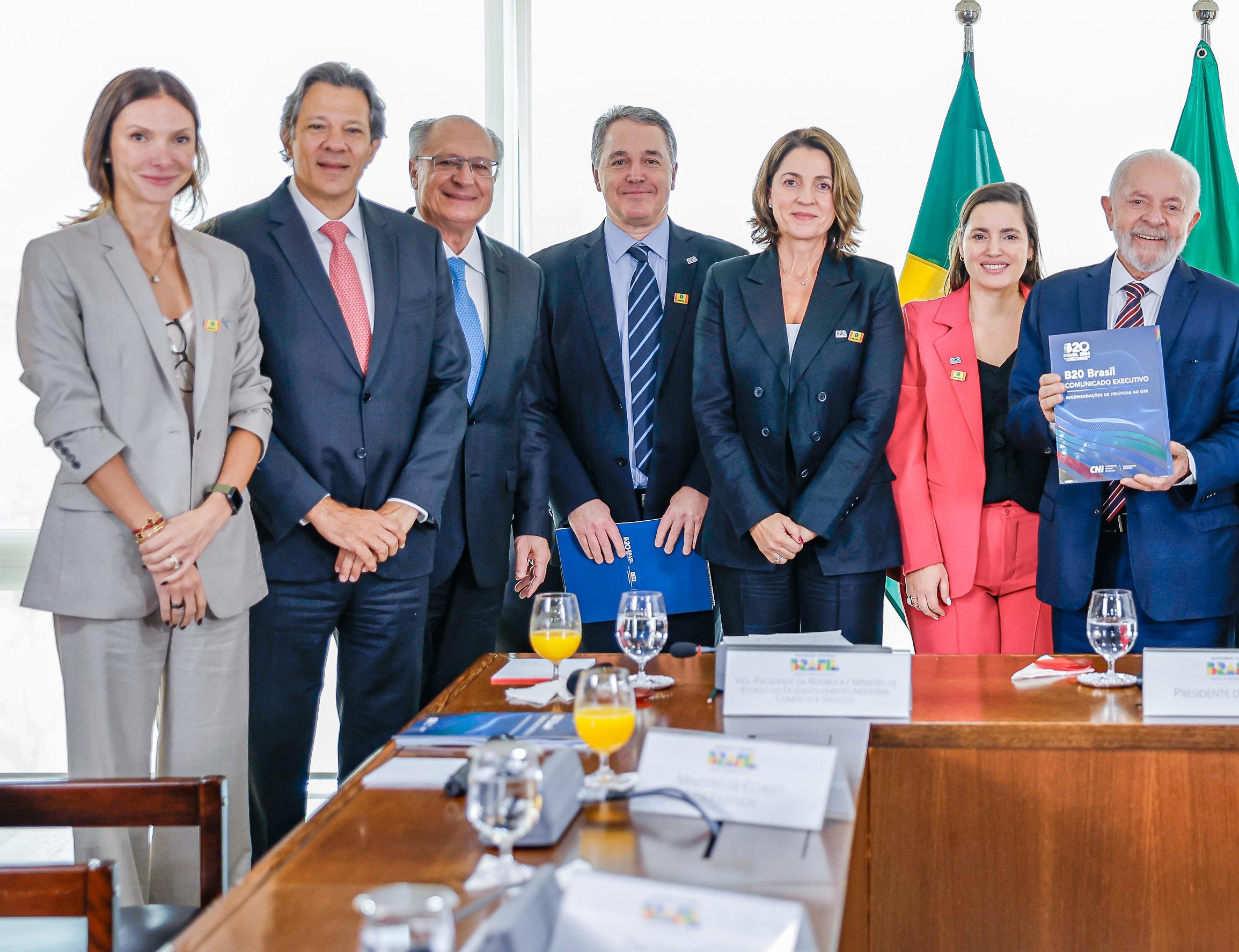
19 minute read
B20 Brasil Communiqué: A Business Roadmap for Inclusive, Sustainable Growth
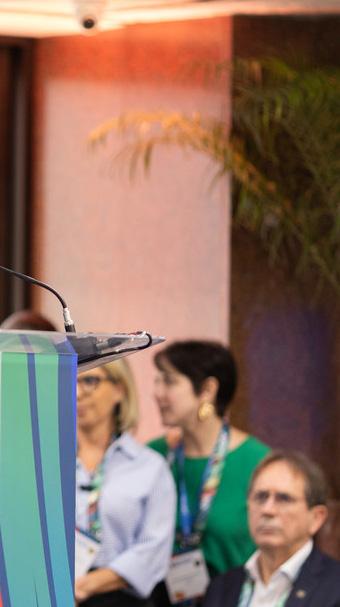
Introduction
The Business 20 (B20), acting as the G20’s official business engagement group, convened under Brazil’s presidency in 2024 to embark on an ambitious mission: to forge a path toward “Inclusive Growth for a Sustainable Future.” This document, the B20 Brasil Final Communiqué, is not merely a list of policy recommendations but the culmination of a year of rigorous work by global business leaders, policy experts, and stakeholders. It represents a shared commitment to address the complexities of today’s world, providing concrete, actionable strategies designed to meet the pressing economic, social, and environmental challenges of our time. Guided by five core principles, the B20 Brasil presents a comprehensive, strategic vision for a more equitable and prosperous world, outlining concrete, actionable steps towards realizing this vision.
The B20’s Role in Global Governance
The B20 acts as a crucial bridge between the G20 and the global business community, playing a critical role in shaping the global policy agenda. By providing insights, recommendations, and actionable solutions, the B20 enhances the effectiveness of global decision-making. The B20’s mandate is to give voice to the private sector’s perspectives and to address challenges and opportunities that are specific to their experiences, leveraging their knowledge and expertise to provide robust and effective policy recommendations. This year, the B20 Brasil cycle, with its focus on “Inclusive Growth for a Sustainable Future,” sought to align the priorities of the business community with broader G20 concerns. The emphasis was on developing concrete, measurable solutions that would translate into meaningful action at the highest levels of global policymaking.
B20 Brasil Leadership
The B20 Brasil initiative was under the guidance of the following key leaders:
• Chair: Dan Ioschpe, a prominent Brazilian business leader, took on the role of chair.
• Advisory Council President: Antonio Ricardo Alvarez Alban, President of the Brazilian National Confederation of Industry (CNI)
• B20 Sherpa: Constanza Negri Biasutti →
→ The combined experience of these leaders, coupled with the insights and contributions of the Task Force and Action Council Chairs, Co-Chairs, and members, ensured the development of comprehensive, and balanced policy recommendations. The collaboration created an environment that promoted diverse viewpoints and a shared sense of urgency.
The Pillars of the 2024 Agenda: Five Guiding Claims
At the heart of the B20 Brasil agenda, five guiding claims serve as the cornerstone for all policy recommendations. These foundational claims, address the key challenges and opportunities shaping the global socio-economic landscape and represent the interconnectedness of different sectors and global concerns:
1. Promoting Inclusive Growth and Combating Hunger, Poverty, and Inequalities: The recognition that no sustainable prosperity can be achieved without addressing systemic inequalities. This requires actions designed to uplift marginalized communities, provide equal opportunities, and eradicate extreme poverty and hunger.
2. Accelerating a Fair Net-Zero Transition: This pillar acknowledges the urgent need to address climate change. It promotes a swift transition to net-zero economies, while ensuring that all actors are part of a just and fair process.
3. Increasing Productivity Through Innovation: The recognition that innovation is key to long-term prosperity, and that it must be harnessed to boost efficiency and productivity.
4. Fostering the Resilience of Global Value Chains: Highlighting that a healthy global economy depends on a functioning global system of trade, B20 seeks to ensure supply chains are robust and adaptable to future shocks.
5. Enhancing Human Capital: This final pillar emphasizes the essential role of investing in people, developing new skills, and ensuring that all members of society are prepared for the challenges and opportunities of the future.
These claims are interconnected, and are mutually reinforcing to provide a cohesive framework for the B20 Brasil policy proposals.
SECTION 1:
GUIDING CLAIMS AND SYNERGIES
This section presents a deep exploration of the five guiding claims and their implications for global business and policy. It also explains the specific synergy areas that were identified as points of convergence for the diverse perspectives and proposals from all Task Forces and the Action Council.
Guiding Claim 1: Promoting Inclusive Growth and Combating Hunger, Poverty, and Inequalities
• The Global Context: While global GDP has increased steadily in recent decades, there has also been a drastic rise in global inequalities, and hundreds of millions of people continue to be trapped in extreme poverty and hunger. The COVID-19 pandemic has exacerbated these issues. Data from the World Inequality Report reveal that the top 10% of the world’s population hold 76% of all global wealth, while the poorest half own just 2%. Women’s economic empowerment is also still not prioritized, with women’s share of total labor income standing at less than 35%. These inequalities contribute to global instability and hold back human potential.
• B20 Response: B20 Brasil recognizes that promoting true inclusive growth needs comprehensive solutions that are not focused on economic growth alone. B20 Brasil’s recommendations center on: marginalized are provided with pathways to economic prosperity, with a special focus on MSMEs and entrepreneurship. Support systems need to focus on access to financial resources, creating collaborative relationships with the public and private sectors and enabling environments where all can thrive.
- Transforming Global Food Systems: B20 believes that a transformation of the current system is needed to ensure access to safe and nutritious food for all. This includes the promotion of sustainable agricultural practices, and supporting the dissemination of technologies and technical assistance. Financial mechanisms should also be prioritized for small and medium sized enterprises in the sector, along with a focus on promoting access to global markets through fair trade principles.
- Example: The B20 is encouraging policies that support agro-ecological methods and the use of precision agriculture techniques.
• Promoting Diversity and Inclusion: The B20 recognizes that underrepresented groups continue to face barriers that limit their potential. To ensure equality, the B20 supports measures to address systematic discrimination, prejudice, and biases that limit access to education, employment, healthcare, and political participation.
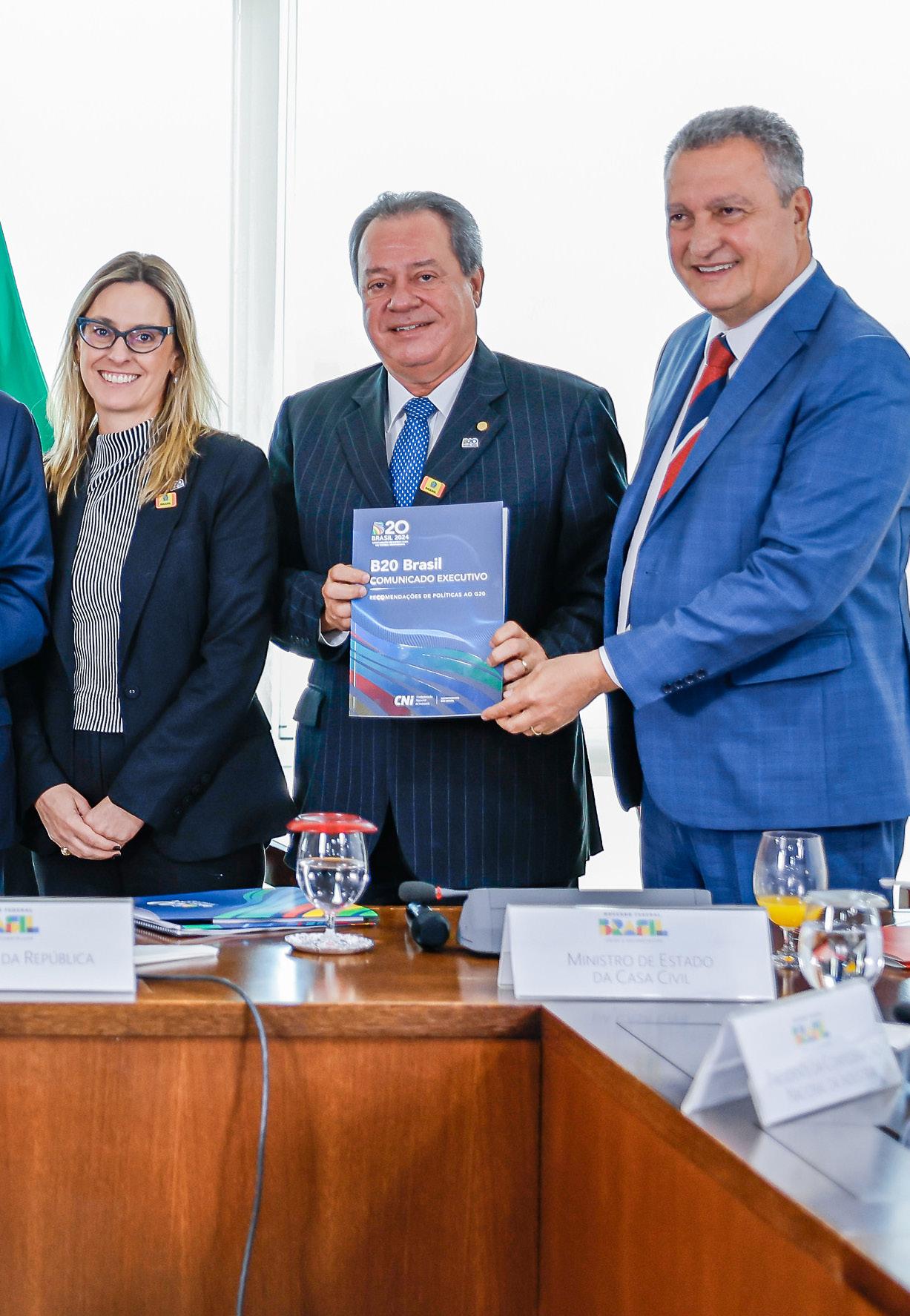
Data from the World Inequality Report reveal that the top 10% of the world’s population hold 76% of all global wealth, while the poorest half own just 2%. Women’s economic empowerment is also still not prioritized, with women’s share of total labor income standing at less than 35%. These inequalities contribute to global instability and hold back human potential.
- Example: B20 promotes the adoption of inclusive financial instruments and investment vehicles that meet the specific needs of MSMEs.
Synergy Areas within Guiding Claim 1:
• Synergy 1.1: Inclusive Food System Transformation: Recognizing the importance of food for both economic growth and human well-being, this synergy brings together sector specific solutions to further a holistic approach. This approach calls for enhancing production efficiency and promoting investment in sustainable practices, while also ensuring that value chains are inclusive, efficient and equitable.
- Example: The B20 advocates for integrating digital technologies for traceability of food products.
• Synergy 1.2: Diversity and Inclusion Across Sectors: This synergy underscores the need to tackle barriers to inclusion at all levels. This requires promoting fair representation and equal access to resources and opportunities, particularly for women, minorities and those that are socioeconomically disadvantaged.
- Example: The B20 supports the adoption of policies that measure diversity in the workforce and leadership.
Guiding Claim 2: Accelerating a Fair Net-Zero Transition
• B20 Response: The B20 acknowledges the urgency of transitioning to net-zero, while emphasizing that this process must be fair, equitable, and aligned with the needs of people and planet. To do this, the B20 has focused on recommendations that:
- Promote a Just and Fair Transition: Acknowledging that the move away from fossil fuels has impacts on all segments of society. Governments and businesses must actively ensure that workers, communities and vulnerable groups are at the forefront of new planning and initiatives.
- Scale up Climate Finance:
The B20 calls for a concerted effort to increase the flow of private and public capital to climate action. This includes innovative finance mechanisms, better use of development funds, and the expansion of capital markets for low-carbon investments.
- Ensure Corporate Transparency: As sustainability continues to move from the fringes to the mainstream, a set of standards and metrics are needed to provide transparency and accountability to all stakeholders, from consumers, to investors, to governments.
Synergy Areas within Guiding Claim 2:
- Example: The B20 recommends public policies that support and ensure equal opportunities for underrepresented groups, including legislation that provides accessible and diverse workplaces
* Fostering Economic Empowerment: It is imperative that those who are
• The Global Context: The Intergovernmental Panel on Climate Change (IPCC) reports highlight that the effects of climate change are already being seen across the globe. Failing to take action has a disproportionate effect on those who are most vulnerable and it will be essential to limit warming to 1.5C above preindustrial levels to reduce irreversible environmental damage. Recent data indicates that there is a huge gap between the current commitments from governments and what is needed to reach the goal of limiting warming. This gap is further exacerbated by the massive investments that will be needed.
• Synergy 2.1: Ensuring a Fair NetZero Transition: The B20 sees that this transition requires a strong commitment from all to build a sustainable future. Policy recommendations need to be fair and address socio-economic needs. This calls for collaboration across multiple stakeholders and the adoption of standards to help with a collective response.
- Example: B20 calls for workforce development programs to equip workers with the new skills that are required for green economy jobs.
• Synergy 2.2: Financing the Net-Zero Transition: B20 has identified a key need to de-risk climate investments, while promoting the development of innovative financial instruments to unlock much needed funding and capital.
- Example: The B20 supports the development of carbon markets that can be used to incentivize reduction and to protect nature. →
Guiding Claim 3: Increasing Productivity Through Innovation
• The Global Context: In recent decades the world has seen significant gains in living standards thanks to robust economic growth. Productivity gains have been a key driver to this process, but the last decade has seen a sharp slowing down in productivity growth.
• B20 Response: The B20 recognizes the critical importance of innovation to accelerate sustainable economic growth by:
- Boosting Investment in R&D: Research and development is essential to drive long term productivity increases, and to generate new technological solutions to meet future challenges.
- Leveraging Digitalization: A better adoption of digital tools and technologies across all sectors will allow for enhanced efficiency and productivity. This includes the expansion of digital infrastructure and skills to support their proper implementation.
- Optimizing Resources: The correct allocation of resources through competition, globalization, and dynamic business environments will help to maximize investment and increase productivity.
Synergy Areas within Guiding Claim 3:
• Synergy 3.1: Enhancing SectorSpecific Applications of Digital Technologies and AI: This synergy focuses on the need to accelerate the integration of AI into specific sectors, highlighting its transformative potential, while acknowledging the need for responsible adoption, that is guided by international cooperation, ethics, and the implementation of regulatory frameworks.
- Example: The B20 recommends policies to support AI innovation clusters and ecosystems.
• Synergy 3.2: Enhancing Global Commerce Through Data Free Flow with Trust and International Cooperation: In today’s digital economy, the free flow of data is essential for innovation and growth, but also needs to be balanced with the need for trust and security. This calls for a multi-stakeholder approach to the operationalization of DFFT and building interoperable systems to support cross border trade.
- Example: The B20 calls for a collaboration between governments and businesses to establish inter operable data-sharing frameworks.
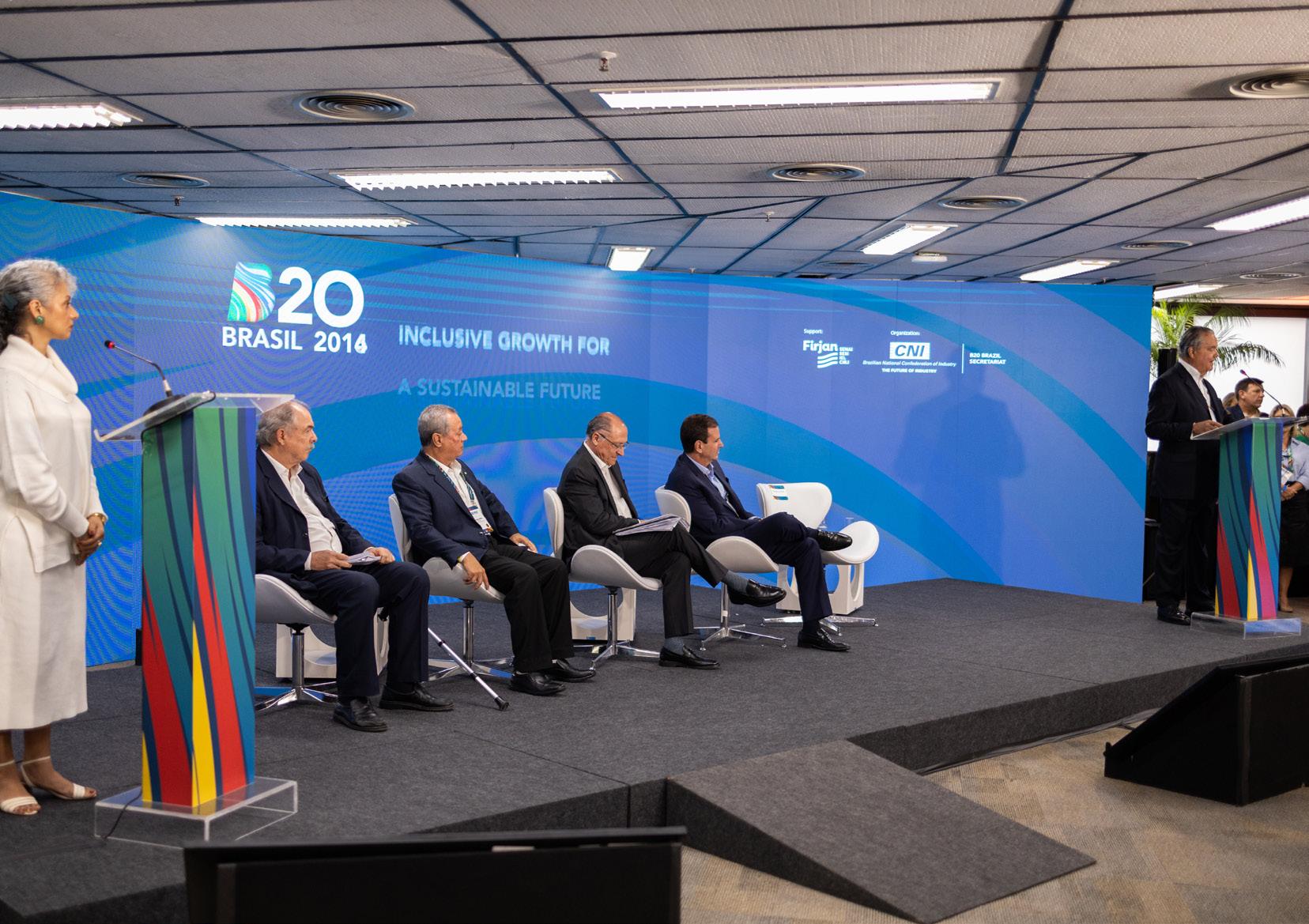
Guiding Claim 4: Fostering the Resilience of Global Value Chains
• The Global Context: GVCs have reshaped the world economy and increased global trade and investment. Yet these supply chains have shown their vulnerability during times of crisis, especially during the COVID-19 pandemic. Severe production shocks nd geopolitical tensions are highlighting the need to build greater resilience.
• B20 Response: B20 recognizes the importance of building strong and robust supply chains by:
- Risk Management: It is key to strengthen risk assessment across global value chains, improving transparency, diversifying suppliers and implementing more robust systems.
- Sustainability: GVCs also need to prioritize long term sustainability by promoting circular economy principles and investing in alternative energy sources, while safeguarding the rights of workers.
- Multilateral Cooperation: Public policy must focus on strengthening the WTO and the multilateral trading system, promoting predictability and minimizing protectionism, and facilitating investment in technology, training and capacity building.
Synergy Areas within Guiding Claim 4:
• Synergy 4.1: Financing Micro, Small, and Medium-Sized Enterprises: MSMEs have a critical role in promoting economic growth and job creation, particularly in emerging markets. To improve their competitiveness and allow them to better navigate the new global context, actions must focus on addressing their financial needs, removing administrative hurdles and offering tailored support.
- Example: The B20 supports the streamlining of bureaucratic processes and simplified regulatory frameworks to help MSMEs.
• Synergy 4.2: Enabling Sustainability and Resilience in GVCs Through Trade: This synergy recognizes the power of trade in advancing both sustainability and resilience in global value chains. It supports open markets, promotes the adoption of sustainable practices, and encourages collaboration to drive long-term growth and responsible use of resources.
- Example: The B20 supports the use of internationally accepted methodologies for carbon footprint calculation and reporting.
Guiding Claim 5:
Enhancing Human Capital
• The Global Context: The future of work is undergoing constant changes, driven by technology, automation, and changing environmental conditions. This requires that education and training systems adapt to prepare people for future opportunities. This includes a growing need for lifelong learning and upskilling programs, and it requires the development of frameworks to support individuals and communities in navigating new realities.
• B20 Response: The B20 emphasizes policies that:
- Provide Enhanced Educational Opportunities: This includes investments in educators, new curricula, and ensuring access to digital learning and digital infrastructure. It also includes the need to modernize and create more relevant vocational training for the demands of the future.
- Promote Reskilling and Upskilling: This can be done through flexible pathways that recognize skills and competencies for different forms of education, including micro-credentials, non-traditional learning, and workintegrated programs.
• Ensure Workforce Inclusion: The workforce must reflect the population it serves. Barriers that limit access to employment must be removed, promoting a more diverse and equitable job market.
Synergy Area Within Guiding Claim 5:
• Synergy 5.1: Inclusive, Productive, and Resilient Workforce: This synergy brings together multiple strands that aim to help the global community tackle the challenges and opportunities of the new world of work. It promotes quality education, enhanced access to training, and the implementation of measures that foster diversity and inclusion in the workforce. It also requires the support of the public sector, the private sector, and civil society to provide resources and opportunities for all.
SECTION 2: POLICY RECOMMENDATIONS BY B20 TASK FORCES AND ACTION COUNCIL
This section offers a detailed summary of the actionable policy recommendations proposed by each of the B20 Task Forces and Action Council. Each summary is expanded here to include a more detailed list of priorities and actions. (Note: Each of the next sections will follow the below structure)
Task Force/Action Council Title: Expanding on Key Policy Recommendations
Core Themes: This will provide an overview of the key areas of focus for this Task Force or Council.
Policy Priorities: This section will outline the main areas of policy action that are deemed as crucial for the particular mandate. Specific Actions for the G20: This section will highlight specific, detailed recommendations that the Task Force and Action Council deem crucial for implementation.
Trade & Investment Task Force: Expanding on Key Policy Recommendations
• Core Themes: Improving global trade and investment governance, promoting sustainable and resilient trade, and enhancing trade efficiency.
• Policy Priorities: The B20 calls for strengthening the multilateral trading system by restoring the WTO Dispute Settlement Body (DSB); enhancing transparency and cooperation in trade by developing a common framework for carbon reporting, reducing protectionist policies and addressing supply chain vulnerabilities; increasing access to trade finance through digital technologies.
• Specific Actions for the G20:
- Restore and reform the WTO DSB to provide a platform for dispute resolution.
- Establish multilateral and plurilateral agreements to liberalize trade and minimize future trade barriers.
- Promote internationally accepted methodologies for carbon footprint reporting for all products and services.
- Review unilateral restrictive trade policies and implement regulatory mechanisms to promote resilience.
- Adopt digital document standards for customs clearance and enhance access to trade finance for LDCs and MSMEs.
Employment & Education Task Force: Expanding on Key Policy Recommendations
• Core Themes: Preparing a resilient workforce for the future of work, fostering diverse and inclusive workplaces, and boosting innovation and sustainable growth.
• Policy Priorities: Developing skills for the future through modernized education and training systems; enhancing representation of underrepresented groups, while promoting the recognition of alternate and future forms of work, while fostering collaboration in areas of research and technology.
• Specific Actions for the G20:
- Increase emphasis on STEM and digital skills, and modernize teacher training to include these elements.
- Create financial incentives to promote programs for reskilling and upskilling with an emphasis on work-integrated learning solutions.
- Prioritize the development of international tax frameworks to support job mobility and safe labor migration. →
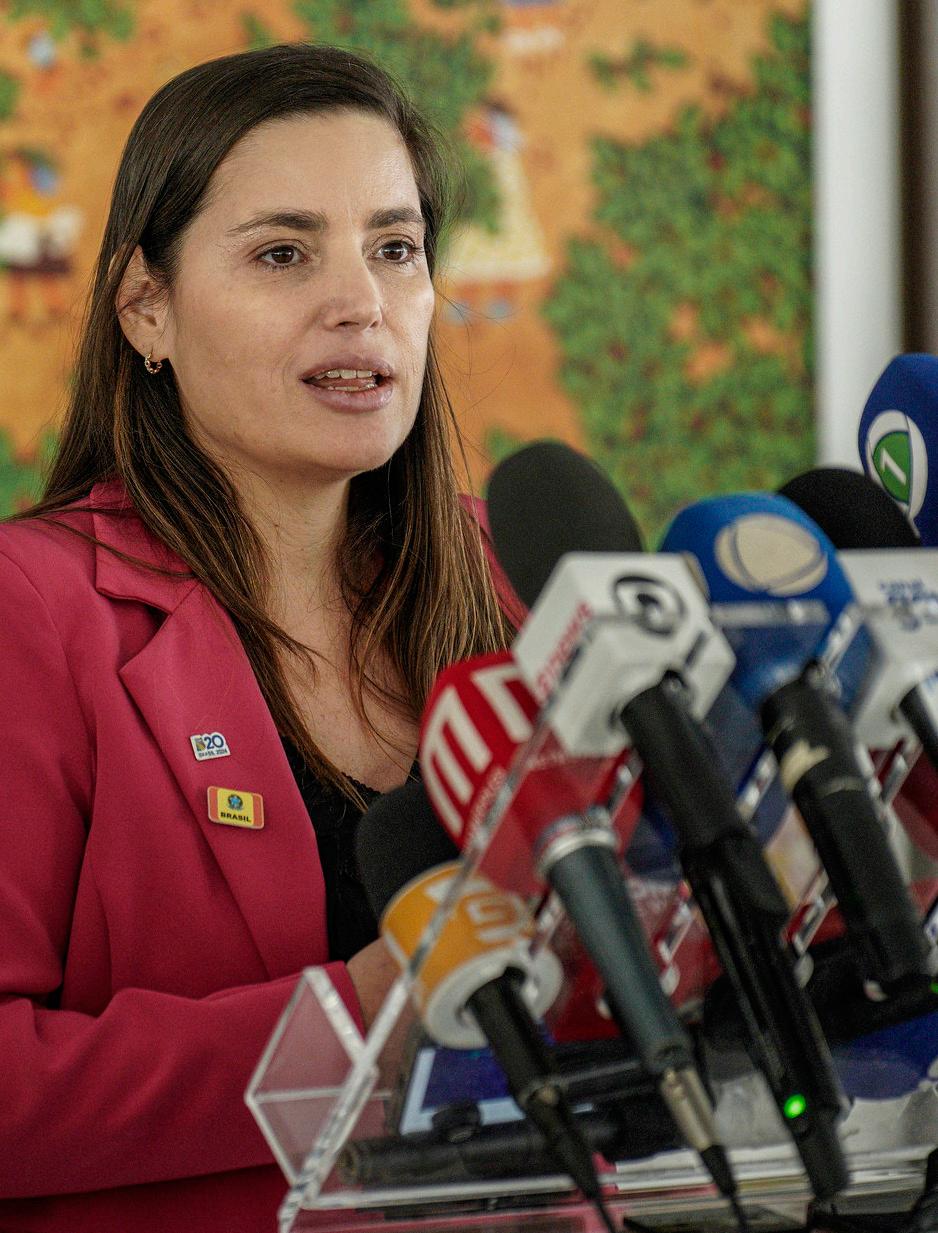

- Incentivize companies to promote equal access to work opportunities, and reward programs to promote D&I.
Energy Transition & Climate Task Force: Expanding on Key Policy Recommendations
• Core Themes: Transitioning to renewable energy, increasing energy efficiency, and implementing natural climate solutions.
• Policy Priorities: Increasing the use of sustainable renewable energy sources while also ensuring a just transition that is inclusive; making use of best practices to double energy efficiency; implementing nature-based carbon capture solutions.
• Specific Actions for the G20:
- Tripling renewable energy capacity by 2030, and expanding grid infrastructure.
- Establish incentives to promote bioenergy and biofuel, while accelerating the transition to net-zero emissions
- Promote the creation of a thriving Natural Climate Solutions global market.
- Double the average annual rate of energy-efficiency improvement while supporting the uptake of circular economy practices.
Digital Transformation Task Force: Expanding on Key Policy Recommendations
• Core Themes: Achieving digital connectivity, safeguarding data, and leveraging AI ethically.
• Policy Priorities: Increasing global connectivity; ensuring cybersecurity and digital trust; and harnessing the benefits of AI ethically and responsibly.
• Specific Actions for the G20:
• Promote Public-Private Partnerships to encourage investments in digital infrastructure and reduce gaps in usage across different populations
• Adopt digital standards for trade transactions and streamline the interoperability of data for better flow of information.
* Foster international cooperation to improve cyber-security, while establishing frameworks that promote responsible AI development, deployment and governance.
Finance & Infrastructure Task Force: Expanding on Key Policy Recommendations
• Core Themes: Catalyzing private capital, increasing public financing, and ensuring the integration of MSMEs into value chains.
• Policy Priorities: Mobilizing private sector climate financing; developing infrastructure projects that contribute to a net zero and resilient economy; while supporting the needs of MSMEs in the global value chain through regulatory and financial support.
• Specific Actions for the G20:
- Review and promote best practices for public sector financing.
- Develop innovative and risk mitigating tools to facilitate private sector investment.
- Streamline permitting processes for climate-resilient projects and promote the use of technology to support infrastructure roll-out.
- Facilitate global integration of MSMEs by developing cross-border interoperability and reviewing the regulatory frameworks that affect MSMEs access to trade and finance.
Integrity & Compliance Task Force: Expanding on Key Policy Recommendations
• Core Themes: Developing robust measures against corruption, fostering collective action for integrity, and promoting ethical leadership.
• Policy Priorities: Promoting the implementation of anti-corruption measures; fostering collaboration across sectors, and encouraging ethical leadership to build trust and social responsibility.
• Specific Actions for the G20:
- Provide incentives for private sector anti-corruption practices and convergence of sustainability standards.
- Foster collective action by engaging the public, private and civil society sectors, and strengthen cooperation across value chains.
- Promote international frameworks to enhance ethical business practices and the responsible use of new technologies and AI.
Sustainable Food Systems & Agriculture Task Force: Expanding on Key Policy Recommendations
• Core Themes: Supporting food productivity and sustainable technologies, developing funding models for transition, and promoting fair agricultural trade.
• Policy Priorities: Increasing the productivity of agricultural sectors; developing financing systems that can support the transition to sustainable practices, and reinforcing the role of the WTO to ensure a fair trading system.
• Specific Actions for the G20:
- Promote investments in scientific research and development to support sustainable agriculture, and facilitate access to agronomic technical assistance and promote the implementation of innovative technologies.
- Facilitate new financing tools to support climate resilient food systems and practices.
- Strengthen the multilateral agricultural trading system, eliminating marketdistorting barriers and implementing international standards for sustainability in trade.
Women, Diversity, and Inclusion in Business Action Council: Expanding on Key Policy Recommendations
• Core Themes: Increasing the participation of underrepresented groups, enabling inclusive environments in the labor force, and promoting ethical leadership to advance D&I in business.
• Policy Priorities: Addressing structural inequalities that limit the participation of underrepresented groups; fostering access to equitable opportunities, while promoting a more inclusive work culture that incorporates policies to combat bias and promote equality.
• Specific Actions for the G20:
- Create guidelines for data collection for underrepresented groups, and create strategies tailored for every sector.
- Promote financial incentives to implement diversity and inclusion action plans, while supporting care provisions.
- Promote policies that focus on equitable access to education, and support for upskilling and reskilling to create equitable work places.

The purpose of this pillar is to leverage the B20 agenda to create a positive impact within Brazil, supporting key priorities and addressing pressing local challenges. It is designed to bridge global policy with local action and bring international recommendations and insights into national level programs.
SECTION 3: B20 BRASIL LEGACY – ENSURING CONTINUITY AND IMPACT
The B20 Brasil Legacy program has been carefully designed to ensure the sustainability and continuity of the B20 process. This is done through the implementation of three critical pillars that target specific aspects of impact, governance, and continuity:
• B20-to-B20 Transition: This pillar is designed to facilitate a more seamless handover to future B20 presidencies and promotes greater collaboration with incoming hosts, building on the successes of previous cycles. This will include strategic planning, knowledge transfer, and the provision of detailed documentation and tools to facilitate the implementation of previous agreements and policies.
• B20-Society Initiatives: The aim of this pillar is to create real-world impact by supporting action-driven initiatives led by private sector organizations, civil society, and other institutions. These initiatives aim to address specific challenges around the B20 guiding claims while creating long lasting tangible results, and strengthening the links between B20 and broader society. →
• B20-Brasil Domestic Action: The purpose of this pillar is to leverage the B20 agenda to create a positive impact within Brazil, supporting key priorities and addressing pressing local challenges. It is designed to bridge global policy with local action and bring international recommendations and insights into national level programs.
Key Objectives of B20 Legacy
• B20-to-B20 Transition: To facilitate a smooth handover and ensure continuity across different cycles of the B20. This is designed to be a practical approach to ensure knowledge is shared and that future B20s can leverage from previous work.
• B20-Society Initiatives: To encourage the business community to put recommendations into practice by engaging in action-oriented programs and collaborations. This allows for new and innovative programs to be designed.
• B20-Brasil Domestic Action: To generate impact within Brazil and address domestic concerns, while fostering public-private partnerships, and ensuring national and local alignment.
Examples of B20 Legacy Initiatives
B20 Brazil developed several exemplary projects to highlight its work:
• SheLeads B20: The SheLeads program is designed to increase the representation of women in B20 leadership positions. It aims for concrete results in each B20 cycle, reducing gender disparity.
• B20 Women in Trade Initiative: This initiative partners with the G20’s Trade & Investment Working Group, developing policies that will help women navigate international trade opportunities, and ensuring that they receive a fair share of the benefits.
• B20 Climate Hub: A critical resource hub, created as a public web portal, that showcases effective policies for implementation.
• B20 Carbon Center of Excellence: The B20 recognized that there is a need for knowledge and support in scaling up carbon markets, so they created a new hub to drive practical action.
• B20 Collective Action Hub: To promote collective and collaborative action on ethical behavior, transparency and good governance and address all forms of corruption.
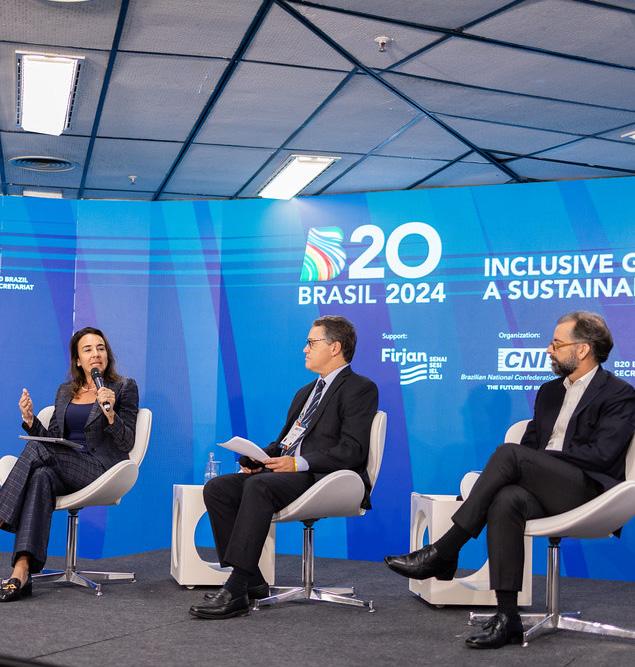
The SheLeads program is designed to increase the representation of women in B20 leadership positions. It aims for concrete results in each B20 cycle, reducing gender disparity.
• B20 AI Platform: To address concerns about the ethical use of Al and to promote frameworks that guarantee responsible Al adoption to promote both innovation and increase productivity.
Statements From The Advisory Council And International Business Advisory Caucus
This section would present detailed statements from key members of the B20 Brasil Advisory Council and the International Business Advocacy Caucus. These perspectives will highlight the importance of the recommendations and the collective endorsement by the global business community.
Annex 1: B20 Structure and Composition
This annex will include a detailed organizational chart illustrating the relationships between the Steering Committee, Task Forces, Action Council, and other working groups. A comprehensive list of the members of both the Advisory Council and the International Business Advocacy Caucus with their affiliations will also be provided. Finally, a detailed timeline will also show the key meetings, deliverables and milestones of the B20 Brasil cycle, and including transition activities to next cycle.
Annex 2: KPI Dashboard
The comprehensive KPI Dashboard will offer specific metrics to measure the progress of B20 recommendations and facilitate ongoing monitoring, evaluation, and accountability. These key performance indicators (KPIs) are based on the policy recommendations put forward by each Task Force and the Action Council. The dashboard provides concrete, measurable targets that will help track and monitor progress and highlight gaps in implementation.
Annex 3: B20 Secretariat
This annex will acknowledge and present the team of dedicated professionals that supported and worked through the B20 Brasil cycle to produce this comprehensive communiqué.
Annex
4: B20
Partners
The full list of all key partners and sponsors that contributed to B20 Brasil’s success will be presented here, highlighting their involvement and the value of collaboration.
CONCLUSION: A BUSINESS VISION FOR A BETTER FUTURE
The B20 Brasil Final Communiqué serves as more than just a policy document, and is in fact a practical and actionable roadmap for a more inclusive and sustainable global economy. It is a testament to the power of business leadership, collaboration, and innovation in addressing complex global challenges. The B20 Brazil cycle, has been focused on building a world that is not only prosperous, but also more equitable and environmentally responsible, urging all G20 members to prioritize the implementation of the proposed recommendations and to work collaboratively with the business sector to drive meaningful change. This document represents B20’s ongoing commitment to building a better future for all. ■












